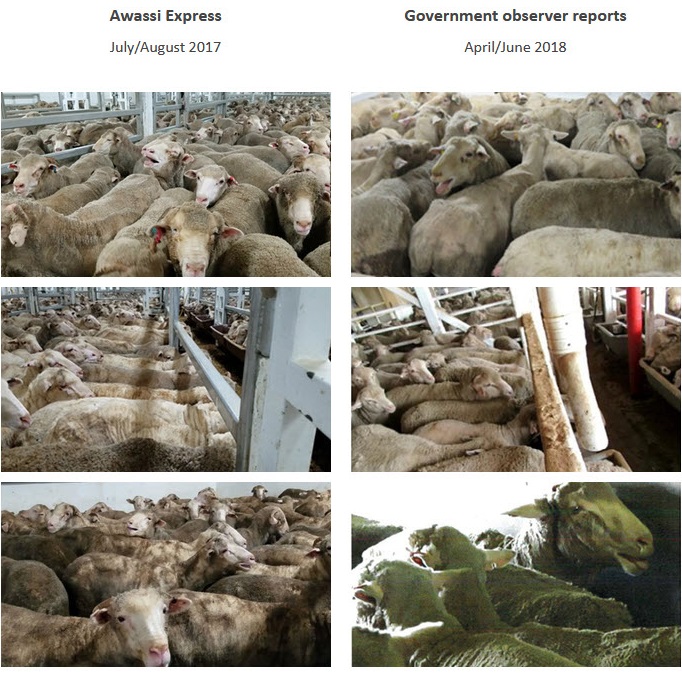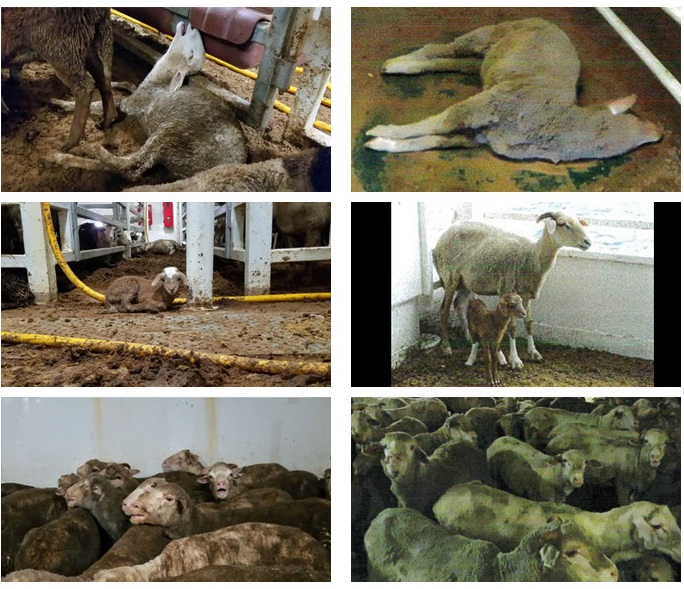Sheep Suffer Severe Heat Stress on the Al Shuwaikh
The summary of an Australian Department of Agriculture observer report from a May 2018 live export voyage - released this week after an almost 12 month delay - reveals suffering and death as a result of the vessel's design and management of livestock on board. The report was delayed until after the government approved the continuation of the live sheep export trade in May - contentious because May is close to the Australian winter season and the sheep are sailed to the Middle East.
The observer’s summary of conditions on board the Al Shuwaikh as she sailed from Fremantle to Kuwait revealed that for eight days sheep were open mouth breathing, indicating severe heat stress, as they “attempted to gain position around the ventilation vents on all open and closed decks.” Multiple instances of “death by smothering” occurred as a result of this. Heat stress was worsened by “oil fuel heaters being left on during the equator crossing” and poor ship design with “dark colored steel roof surface absorbing radiated heat from above.”
Additionally, the observer noted that water troughs were fouled with manure, particularly towards the end of the voyage when a skeleton crew were available to attend the livestock due to discharge preparations. There were significant welfare concerns during discharge, with the livestock, vocalizing loudly, left without fresh feed for over 30 hours.
Moldy food was observed in the bottom of troughs for both sheep and cattle on numerous occasions. Dusty pellets were also observed, and on some decks this was largely attributed to the workings of the automated feeding system.
The observer also noted that during rough weather a ballast tank overflowed into one of the sheep pens.
The Department of Agriculture placed observers on board after whistleblower footage was revealed on 60 Minutes which focused on a 2017 Awassi Express voyage when thousands of sheep died of heat stress.
The Department has been accused of a cover up by “sanitizing” the original observer reports to produce the official summaries. After a Freedom of Information battle, the RSPCA gained access to some of the observers' reports. Although they were heavily redacted by the government prior to their release, they highlight a range of welfare issues on other vessels, including heat stress, even though stocking densities were reduced.


RSPCA Australia Senior Policy Officer Dr. Jed Goodfellow described the latest observer summary report as distressing but not surprising. “The scenes detailed in this report are truly horrific. Sheep being smothered to death as they fight desperately for position around ventilation vents to escape the stifling heat and humidity.
“It describes such a frantic situation, and perhaps what is most distressing, is the length of time the animals had to endure this suffering. It wasn’t a few hours, it was eight long days that they were subjected to these unbearable conditions.”
Goodfellow said the report was further evidence of the inherent suffering of live sheep export and questioned why the Department took almost a year to release the report. “Given this knowledge, it is beyond belief the Department could still be willing to give the green light to sheep exports to the Middle East in May this year. When introducing new regulations in March, the Department stated that ‘the risk of adverse welfare outcomes during May remains very low.’
“That couldn’t be further from the truth,” said Goodfellow. “This report was in the Department’s possession in June 2018 – to withhold its release until after the regulations for this northern summer period were made is very concerning indeed. It shows, yet again, that the Department of Agriculture cannot be trusted to effectively regulate live exports and that a truly independent regulator is urgently required.”
The Al Messilah departed Fremantle for the Middle East with approximately 56,000 sheep last week, and further live export vessels (including the ship featured in this report, the Al Shuwaikh) are expected in Fremantle later in the month.
Goodfellow says Australia should not be party to the suffering caused by the live export trade, and with the nation going to election polls on May 18, other welfare groups are rallying behind the Australian Labor Party, currently in opposition. Humane Society International (HSI) has welcomed Labor's animal welfare commitments detailed in its six-point plan.
"The animal welfare sector watched in dismay when national frameworks for animal welfare were dismantled by the Abbott Government in 2013,” said Nicola Beynon Head of Campaigns in Australia for HSI. "This left a policy vacuum on animal welfare at the national level which has served nobody well, least of all the animals.”

that matters most
Get the latest maritime news delivered to your inbox daily.
In its six-point plan, Labor has promised to provide $1 million a year to establish the Inspector-General of Animal Welfare as a statutory position responsible for advising on the protection of animals in all Commonwealth regulated activities. After the latest exposure of extreme cruelty in the live sheep export trade, the current Minister for Agriculture David Littleproud appointed an Inspector-General for the Live Export Trade in March. Under Labor's commitment, the Inspector-General will be charged with a broader remit and working with the states and territories to establish an Independent Office of Animal Welfare. Labor has also committed to resurrect the Australian Animal Welfare Strategy which provides a platform for dialogue between stakeholders.
HSI is also pleased to see Labor recommit to its earlier promises on live export. The six-point plan states: “ Labor will immediately ban the northern summer live sheep trade and propose a plan which would phase out the live sheep trade within five years. The only way to ensure scientific animal welfare standards are met, community expectations on animal welfare are met and for certainty to be provided for our farmers is to ban the northern summer live sheep export trade and to implement an orderly phase out over a five year period.”
